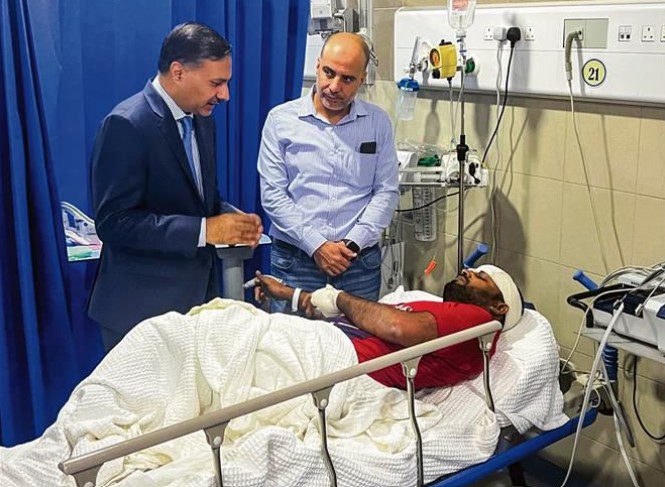Draw lessons from Kuwait blaze to protect workers
It is wrong to assume that labour-exporting countries cannot work together as they are competing with each other.
A building with about 200 foreign workers, mainly from India — with Kerala and Tamil Nadu accounting for the majority — caught fire in the early hours of June 12 in Kuwait. According to a report from Kuwait, the fire broke out around 3.15 am. As the building lacked arrangements for fire-fighting, including a fire alarm, the blaze spread and some residents even tried to jump from the building. At least one person died in such a fatal jump. The fire was reportedly caused by a cooking gas cylinder that was being used by a security guard. The fire department was alerted at 4.30 am and fire extinguishers were promptly sent. The Kuwaiti Home Ministry got a report of the fire by 6 am.
The Kuwait Government has expressed condolences over the loss of 49 lives. Some senior officials of the municipality have been suspended for failing to ensure adherence to safety norms for buildings.
While we spontaneously think of the plight of the bereaved families and of the injured, we should apply our minds to the lessons to be learnt and the measures required to prevent recurrence of such a tragedy.
Let me share a few thoughts based on my professional association with the West Asian region starting from 1976, when I went to Teheran. Our embassies need a better set-up to look after the nine million of our compatriots there. Kuwait has around one million Indians, accounting for 30 per cent of the expatriate population and about 21 per cent of the total population.
The embassy website says that the labour section works from 8 am to 4 pm, Sunday to Thursday. Obviously, barring the security guard, no official will be available to attend to emergencies when the labour section is closed.
In this context, we need to raise a few questions. When did the Indian embassy get information about the fire incident? When did the Indian media get to know of the fire? Hours after it occurred. Why?
When I was in Doha (1992-97), we had cases of maids running away from home seeking shelter in the embassy. We had arranged for an official, preferably speaking the mother tongue of the maid, to come to the embassy within half an hour. This arrangement was good 24x7.
In the present case, I rang up the helpline number of the embassy a couple of times. It was busy. Obviously, there should have been more than one number.
In this context, there is a good deal we in India can learn from the Philippines. When a Philippine citizen arrives in a West Asian country to work as a caregiver or maid, she is received at the airport by embassy officials. She is briefed about the country and how she can get in touch with the embassy in need. She goes to the employer after a day or two. The embassy invariably has labour attachés holding a law degree.
There is no communication or coordination among the labour-exporting countries. Two years ago, I visited the region. I asked the first secretary in charge of consular work and labour welfare whether he attended a conference that the International Labour Organisation had recently organised in the city on the problems of migrant labour. He replied that he had not heard about the conference.
I asked him whether he met his counterparts from manpower-exporting countries to exchange views. The answer was in the negative.
The set-up in the Central Government, too, needs a reform. For a long time, the Ministry of External Affairs (MEA) handled the matter. Later, the Ministry of Overseas Indian Affairs was established in 2004. It was dissolved in 2016 and the MEA resumed charge. There is only one Joint Secretary who is the Protector General of Emigrants, an office that was earlier with the Ministry of Labour.
The MEA organises well-choreographed annual Pravasi Day functions where the affluent members of the diaspora are feted and lauded. Has there been any conference on the problems facing the ABC (ayah, bearer, cook) part of the diaspora?
India is the leading country in South Asia and the leading voice of the Global South. What initiative has New Delhi taken to address the problems of the migrant labour globally? The idea that labour-exporting countries cannot work together as they are competing is wrong.
In the run-up to the 2022 Football World Cup in Qatar, many foreign workers died, mainly due to unsafe working conditions. I do not recall any in-depth investigation by the Indian media.
The Guardian of the UK investigated and concluded that 6,500 migrant workers from South Asia had died, with India accounting for a good part thereof. We have not heard that India officially took up this matter with Qatar.
There is apathy in the government and the media. What can be done to remove that apathy? Any French citizen abroad can vote in the French elections. Let us extend this facility to Indian citizens abroad. If the workers in the Gulf can vote, we might expect our politicians, and consequently, the bureaucracy to take more interest in their welfare.
It might be argued that the Gulf monarchies would resent such a move. I doubt it. The matter deserves to be examined immediately.
The Central Government responded with alacrity once it came to know of the Kuwait tragedy. The Prime Minister chaired an emergency meeting. He sent Minister of State for External Affairs Kirti Vardhan Singh to Kuwait to oversee assistance to Indians injured in the mishap.
In the big evacuation of 1990-91 to bring back 176,000 Indians from Kuwait and Iraq, no minister had to visit Kuwait, except then External Affairs Minister IK Gujral, who oversaw the entire operation. He went there only once and did not interfere with the work of the Ambassador.
This article was published on tribuneindia.com

